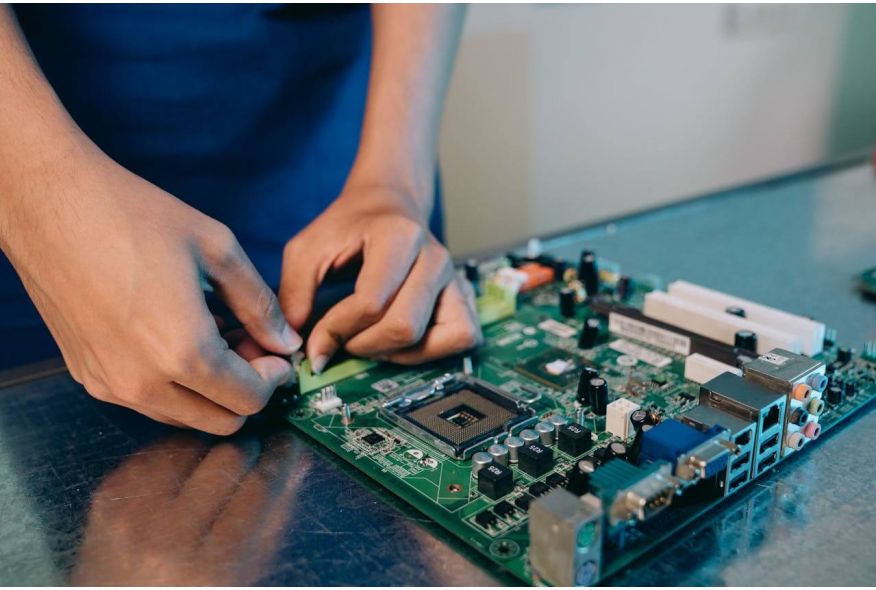How to Choose the Best RAM for Your PC
RAM (Random Access Memory) is one of the most important components in your PC, affecting performance, multitasking, and responsiveness. Choosing the right RAM ensures your system runs smoothly, whether for gaming, video editing, or general use.
In this guide, we’ll explain everything you need to know about RAM, including types, speeds, capacity, and compatibility, to help you choose the best RAM for your build.
1. What is RAM and Why is it Important?
RAM is a type of temporary storage that allows your CPU to access data quickly. Unlike your SSD or HDD, RAM is much faster but doesn’t store data permanently.
- More RAM = Better Multitasking
- Faster RAM = Smoother Performance in Games and Applications
When your PC runs out of RAM, it starts using virtual memory (storage space on your SSD or HDD), which is much slower. That’s why having enough RAM is crucial.
2. How Much RAM Do You Need?
The amount of RAM you need depends on your usage:
| Use Case | Recommended RAM |
|---|---|
| Basic Tasks (Web Browsing, Office Work) | 8GB |
| Gaming (1080p, Most Modern Games) | 16GB |
| Gaming & Streaming, Content Creation | 32GB |
| Professional Work (3D Rendering, Video Editing, AI) | 64GB or More |
Key Tip: If you’re building a PC today, 16GB is the minimum recommended for gaming, and 32GB is ideal for future-proofing.
3. DDR4 vs. DDR5: Which One Should You Choose?
There are two main types of RAM available today: DDR4 and DDR5.
| Feature | DDR4 | DDR5 |
|---|---|---|
| Speed | 2133-3600MHz (Up to 5000MHz) | 4800-8000MHz |
| Latency | Lower (Better for Gaming) | Higher (But Faster Speeds) |
| Power Consumption | 1.2V | 1.1V |
| Price | More Affordable | More Expensive |
| Compatibility | Works with Intel 10th-13th Gen & AMD Ryzen 3000-5000 | Only Works with Intel 12th-14th Gen & AMD Ryzen 7000+ |
If you have an older motherboard, you’ll need DDR4. If you’re buying a new high-end motherboard, it likely supports DDR5, which offers higher speeds but at a higher price.
4. RAM Speed: Does MHz Matter?
RAM speed is measured in megahertz (MHz) and affects how quickly data is transferred.
| RAM Speed (MHz) | Best Use Case |
|---|---|
| 2133-2666MHz | Basic tasks, budget PCs |
| 3000-3600MHz | Best for most DDR4 gaming builds |
| 4000-5000MHz | High-end DDR4 performance |
| 4800-6000MHz | Standard DDR5 speeds |
| 6000-8000MHz | High-end DDR5 for extreme performance |
What’s the Best RAM Speed for Gaming?
- For DDR4, 3200MHz-3600MHz is the sweet spot.
- For DDR5, 6000MHz-7200MHz offers the best performance.
Faster RAM helps reduce lag in CPU-heavy games like strategy and simulation titles (Cities: Skylines, Microsoft Flight Simulator, Total War).
5. Understanding RAM Timings & Latency (CL)
RAM has CAS Latency (CL), which affects how quickly it responds to commands. Lower latency is better.
For example:
- DDR4 3200MHz CL16 is better than DDR4 3200MHz CL18.
- DDR5 6000MHz CL30 is better than DDR5 6000MHz CL40.
When choosing RAM, try to find a balance between speed (MHz) and latency (CL).
6. Single vs. Dual vs. Quad Channel Memory
RAM can be installed in single, dual, or quad-channel configurations.
| Configuration | Performance | Example |
|---|---|---|
| Single Channel | Slowest | 1x 16GB Stick |
| Dual Channel | Faster (Recommended) | 2x 8GB Sticks |
| Quad Channel | Best for Workstations | 4x 16GB Sticks |
For gaming and general use, always install RAM in dual-channel mode (2 sticks). For example, 2x8GB is better than 1x16GB.
7. RGB vs. Non-RGB RAM: Does It Matter?
Some RAM sticks come with RGB lighting, adding style to your PC. RGB RAM offers no performance boost, but it can enhance your build’s aesthetics.
- If you want a clean, professional look, go with non-RGB RAM.
- If you love gaming setups with vibrant colors, choose RGB RAM (Corsair, G.SKILL, Kingston Fury).
8. Compatibility: Will Your RAM Work With Your Motherboard?
Before buying RAM, check:
✅ Motherboard Compatibility – Does it support DDR4 or DDR5?
✅ RAM Slots Available – Most motherboards have 2 or 4 RAM slots.
✅ Maximum Supported RAM Speed – Some motherboards limit RAM speed (e.g., 3600MHz max).
Use tools like PCPartPicker to check compatibility before buying.
9. Best RAM for Different Builds
Best Budget RAM (DDR4)
- Corsair Vengeance LPX 16GB (2x8GB) 3200MHz
- Crucial Ballistix 16GB (2x8GB) 3600MHz
Best Mid-Range RAM (DDR4 & DDR5)
- G.SKILL Trident Z Neo 32GB (2x16GB) 3600MHz CL16
- Kingston Fury Beast DDR5 32GB (2x16GB) 6000MHz CL36
Best High-End RAM (DDR5 for Gaming & Content Creation)
- Corsair Dominator Platinum RGB 32GB (2x16GB) 6400MHz CL32
- G.SKILL Trident Z5 RGB 64GB (2x32GB) 7200MHz CL34
If you want the best performance for gaming, DDR5 6000MHz+ with low latency is ideal.
10. Should You Upgrade Your RAM?
You should consider upgrading your RAM if:
✅ Your PC has less than 16GB and struggles with multitasking.
✅ You’re experiencing stuttering in games due to memory bottlenecks.
✅ You’re doing video editing or 3D rendering and need more memory.
✅ You want to future-proof your PC for upcoming games and software.
Upgrading from 8GB to 16GB can significantly boost performance in gaming and daily tasks.
Final Thoughts
Choosing the right RAM ensures your PC runs efficiently, whether for gaming, work, or content creation.
🔹 For most users, 16GB DDR4 3200MHz is enough.
🔹 For gaming and future-proofing, go with 32GB DDR5 6000MHz.
🔹 For professional tasks, consider 64GB+ with high speeds.
Always check your motherboard compatibility, RAM speed, and latency before purchasing. With the right RAM, your PC will be faster, smoother, and ready for anything. 🚀







